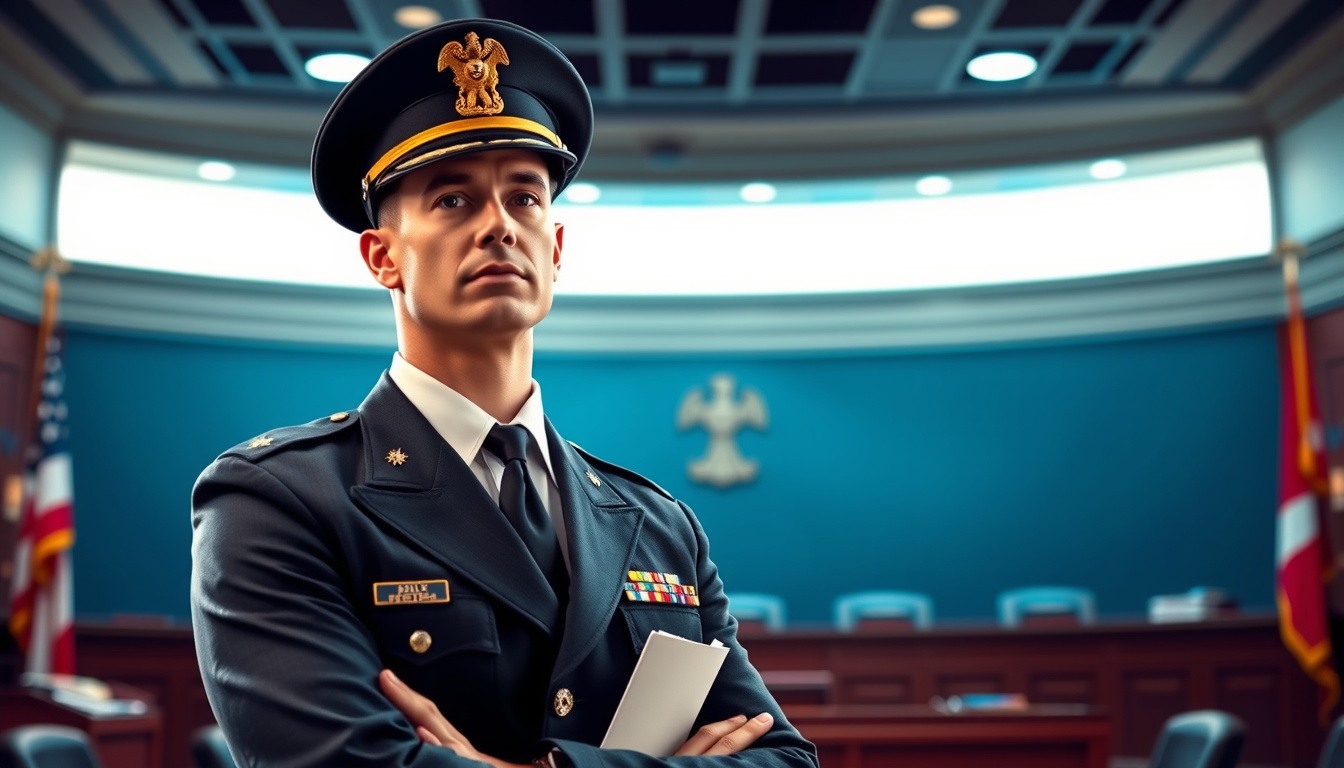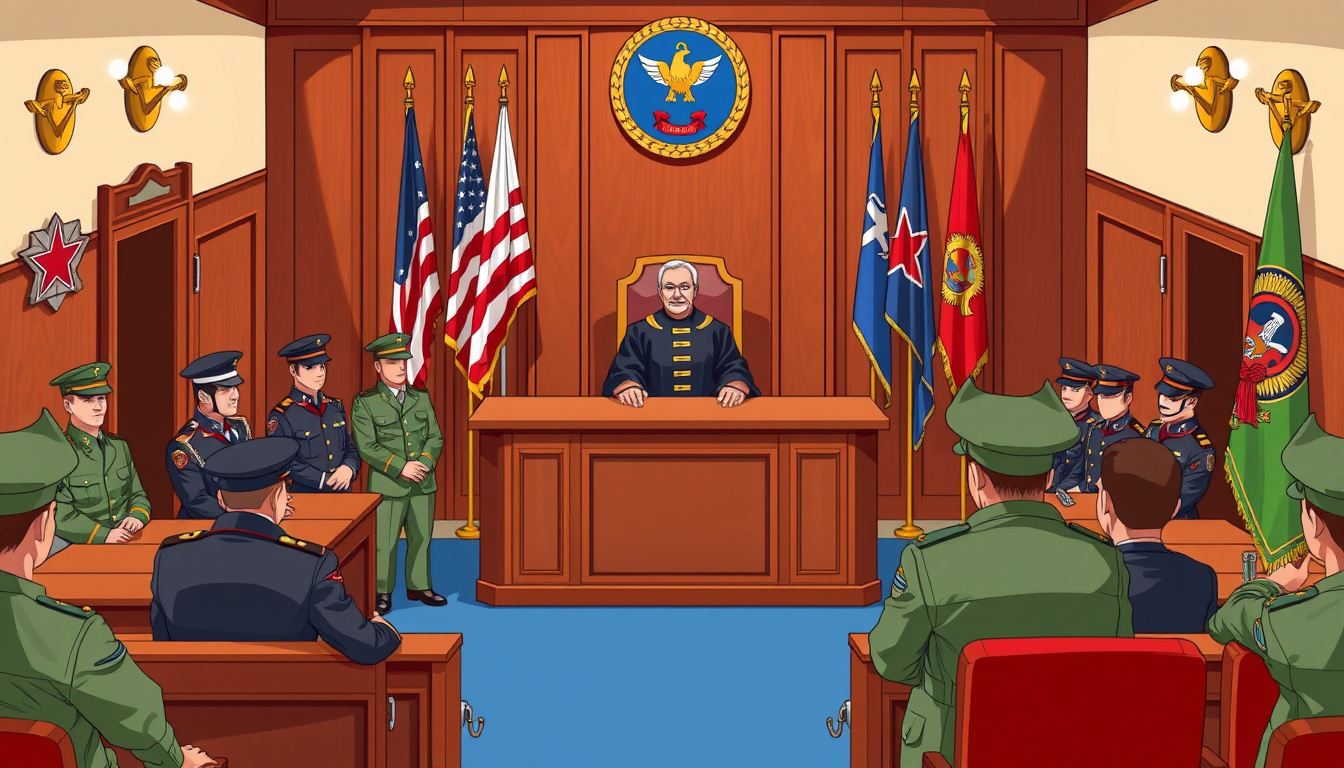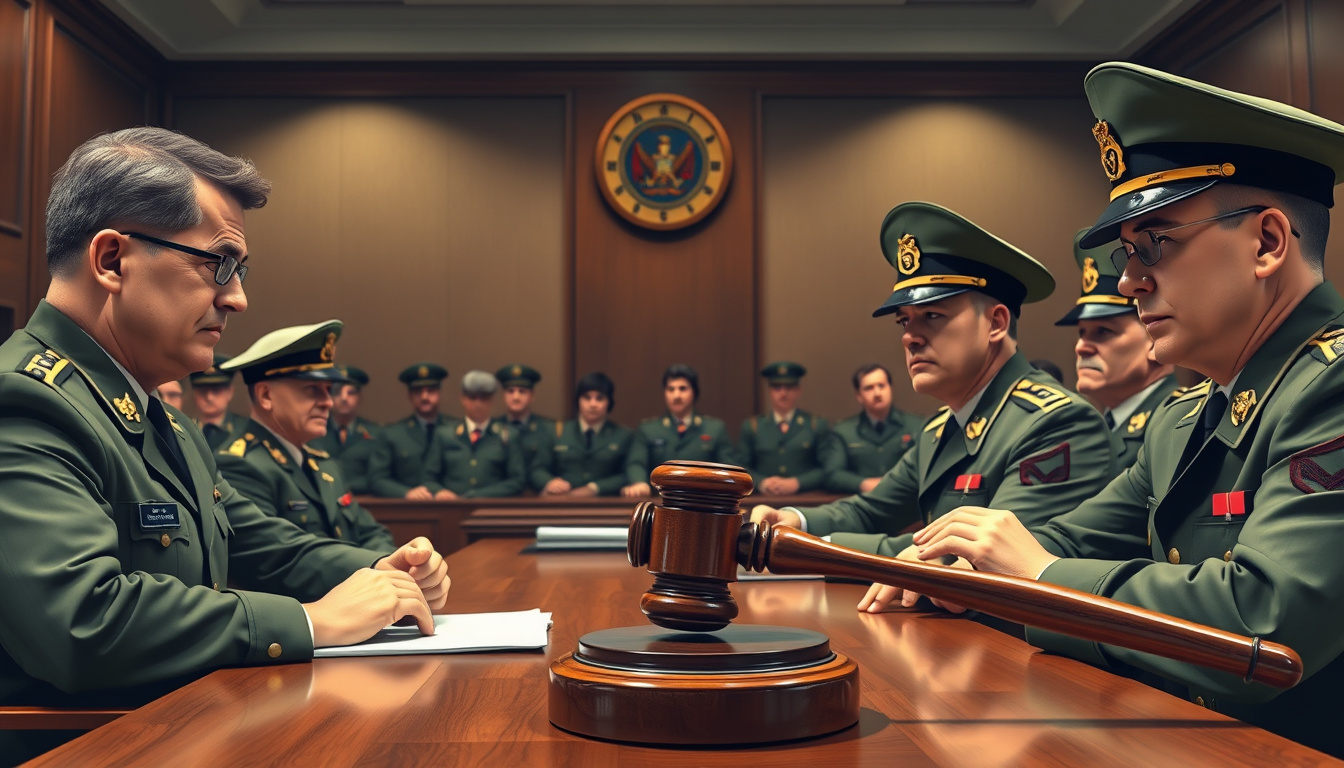Facing a court martial is a significant and daunting challenge for military servicemembers and their families.
The implications of a court martial can be serious, ranging from administrative separation to criminal convictions that could affect your career and future.
In such critical times, having a skilled advocate by your side becomes indispensable.
This is where a top court martial attorney plays a vital role.
Whether you’re dealing with UCMJ allegations or seeking to understand your rights during disciplinary proceedings, it’s crucial to have comprehensive knowledge about court martial processes and the support of a qualified attorney.
In this article, we will explore the essential aspects of court martial, the pivotal role of a court martial attorney, the key qualities to seek in legal representation, and more.

Key Takeaways
- A court martial is a military court that handles serious offenses committed by service members.
- A top court martial attorney plays a crucial role in defending the rights of military personnel facing charges.
- Key qualities to seek in a court martial attorney include experience, knowledge of military law, and strong communication skills.
- Common military offenses addressed by court martial attorneys include desertion, drug offenses, and assault.
- Understanding the court martial process is vital for achieving favorable outcomes in military legal proceedings.
Understanding Court Martial: Definition and Importance
When military personnel face serious allegations, understanding the court martial process becomes crucial for defending oneself effectively.
A court martial is a military trial for members of the armed forces accused of violating the Uniform Code of Military Justice (UCMJ).
Unlike civilian courts, court martials conduct trials to maintain discipline and order within the military ranks.
The importance of a court martial can’t be overstated, as it can lead to significant consequences, including punitive discharge, confinement, or even loss of military benefits.
Having a top court martial attorney can mean the difference between a robust defense and catastrophic outcomes for servicemembers and their families.
These specialized attorneys bring their in-depth knowledge of military law and UCMJ to navigate the complexities of these proceedings.
They not only provide legal representation but also offer invaluable support throughout what can be a harrowing process.
Understanding the fundamentals of court martial is essential for anyone facing such allegations, ensuring that they can take informed steps to protect their rights.
The Role of a Court Martial Attorney
When facing serious allegations, military servicemembers must understand the pivotal role that a top court martial attorney plays in navigating the complexities of military law.
Court martial proceedings are not only daunting but can also have significant consequences on a servicemember’s career, reputation, and freedom.
A skilled attorney well-versed in the Uniform Code of Military Justice (UCMJ) can provide invaluable support, guiding individuals through every aspect of the legal process.
They review charges, build a robust defense strategy, and represent their clients at trial, ensuring that their rights are upheld throughout.
Moreover, the insights and expertise of a top court martial attorney can make a substantial difference in the outcomes of cases, potentially leading to acquittals, reduced charges, or favorable plea agreements.
For servicemembers and their families, having a dedicated advocate in their corner is crucial, not only to combat the immediate legal issues but also to navigate the emotional and personal stress associated with facing court martial proceedings.
‘Injustice anywhere is a threat to justice everywhere.’ – Martin Luther King Jr.

Qualities to Look for in a Top Court Martial Attorney
When facing a court martial or any allegation under the Uniform Code of Military Justice (UCMJ), selecting a skilled legal representative can significantly impact the outcome of your case.
The path may seem daunting, but knowing the essential qualities to look for in a top court martial attorney can alleviate some of the stress and ensure your rights are defended thoroughly.
First and foremost, it’s critical to find an attorney who specializes in military law and has extensive experience in handling court martial cases.
A deep understanding of UCMJ regulations and military procedures is non-negotiable, as these cases often involve unique legal nuance.
Additionally, consider the attorney’s track record in similar cases.
A top court martial attorney should have a history of not only acquittals but also favorable negotiations for reduced charges or alternative resolutions.
Communication is another vital quality; you need someone who will be responsive to your needs, keeping you informed throughout the legal process.
Look for attorneys who demonstrate a client-focused approach, where they prioritize your concerns and take the time to explain legal strategies in a way that you understand.
Moreover, an attorney’s understanding of the military culture and environment can be invaluable.
This familiarity allows for a nuanced defense strategy that can resonate with military jurors.
Personal rapport is equally important; choose an attorney who makes you feel comfortable and confident in their representation.
Lastly, consider seeking referrals or reading reviews to gauge the attorney’s reputation in the military community.
By taking the time to evaluate these qualities, you’ll increase your chances of finding a top court martial attorney who can effectively fight for your rights and future.
Common Types of Military Offenses Handled by Court Martial Attorneys
When military servicemembers face the threat of court martial, it’s crucial to understand the common types of offenses that can lead to such proceedings.
A top court martial attorney can provide essential guidance, ensuring that individuals are aware of their rights and the intricacies of the Uniform Code of Military Justice (UCMJ).
The UCMJ establishes the legal framework for military discipline and covers a broad range of offenses.
Some of the most common types of military offenses include absence without leave (AWOL), insubordination, fraud, and sexual misconduct.
Each of these offenses carries serious consequences, including punitive discharges, confinement, and loss of pay.
For instance, being AWOL for more than 30 days can result in a felony charge, while incidents of insubordination can jeopardize a military career and lead to severe disciplinary actions.
Additionally, allegations of fraud, such as misappropriation of military funds, can result in both military legal action and civilian legal consequences.
Sexual misconduct, which encompasses a wide array of offenses including sexual assault and harassment, is treated with utmost seriousness, often leading to a court martial.
Each case requires a nuanced understanding of military law and may greatly benefit from the expertise of a top court martial attorney who is familiar with the court martial process, from the initial investigation to trial.
Enlisting the help of a skilled legal professional early in the process can make a significant difference in the outcome of the case.

The Court Martial Process: Step-by-Step Overview
When facing a court martial, understanding the intricacies of the military justice system is crucial for servicemembers and their families.
Knowledge of the process not only helps in navigating potential legal challenges but also emphasizes the importance of securing representation from a top court martial attorney.
This article will provide a step-by-step overview of the court martial process, ensuring that those involved are informed and prepared for what lies ahead.
### Step 1: The Investigation
The court martial process typically begins with an investigation.
Should a servicemember be suspected of committing an offense under the Uniform Code of Military Justice (UCMJ), an initial inquiry will be conducted to gather evidence.
This may involve witness statements, documentation, and the collection of physical evidence.
It’s vital during this phase to consult with a top court martial attorney as they can provide guidance on the rights of the accused and ensure that the investigation respects those rights.
### Step 2: Preferral of Charges
Once the investigation concludes, if there is sufficient evidence of wrongdoing, charges will be preferred.
This is the formal process whereby an officer officially accuses the servicemember of a specific offense.
The preferred charges will determine the type of court martial that will be assembled.
It’s critical at this junction to engage with a top court martial attorney to understand the nuances of the charges and establish a defense strategy.
### Step 3: Arraignment
After charges are preferred, an arraignment follows, where the accused servicemember is formally read the charges and asked to enter a plea.
This is a pivotal moment in the court martial process; a top court martial attorney can play a critical role in advising the accused on whether to plead guilty, not guilty, or to request a lesser charge if applicable.
### Step 4: Pre-Trial Actions
Following the arraignment, several pre-trial actions may take place, including motions to suppress evidence or dismiss charges.
This is often where a top court martial attorney shines.
They can file necessary motions on behalf of the servicemember and work to protect their rights before the trial begins.
Additionally, the discovery process allows both defense and prosecution to share evidence, a vital phase that can shape the outcome of the case.
### Step 5: The Court Martial Trial
The trial process itself can vary depending on whether it is a summary, special, or general court martial.
The significance of having a top court martial attorney represents the difference between navigating a complex legal landscape versus being vulnerable to the prosecution.
A knowledgeable attorney will provide a robust defense, cross-examining witnesses and presenting evidence that supports the servicemember’s case.
### Step 6: Sentencing
If found guilty, the court martial will proceed to the sentencing phase.
The atmosphere changes here, as the focus shifts to potential punishments, which could range from administrative action to confinement.
Importantly, a top court martial attorney can negotiate on behalf of the accused for more favorable sentencing options based on mitigating factors.
### Step 7: Appeal
Post-trial, if there are grounds for appeal, the servicemember has the right to contest the court’s decision.
Engaging with a top court martial attorney is essential in this phase as they can guide the servicemember through the complex appeals process, arguing legal errors or constitutional violations in the original trial.
### Supporting Families Throughout the Process
It’s important to remember that servicemembers are not alone in this challenging time.
Families play a vital role and can experience stress and uncertainty throughout the court martial process.
Open lines of communication, access to resources, and potentially the assistance of legal support can help families navigate these turbulent times.
### Conclusion
In summary, the military justice system can be daunting for servicemembers facing a court martial.
With a thorough understanding of each step and the importance of securing a top court martial attorney, servicemembers and their families can better prepare themselves for what lies ahead.
Remember, the representation you secure can have a lasting impact on your career and your future.
Success Stories: Notable Cases and Outcomes
When facing a court martial, it’s crucial to have representation from a top court martial attorney who understands the intricacies of military law.
Success stories from notable cases can provide hope and insight into how skilled legal representation can make a significant difference in outcomes.
For example, in a recent case involving a Marine accused of serious misconduct, a top court martial attorney was able to challenge the prosecution’s evidence effectively.
Through thorough investigation and expert testimonies, the attorney demonstrated that the evidence against the Marine was not only circumstantial but also misleading.
As a result, the charges were dropped before trial, highlighting the importance of having an experienced legal professional by your side.
In another instance, a service member facing administrative separation due to alleged misconduct was able to successfully contest the charges with the help of a top court martial attorney.
By focusing on the service member’s exemplary service record and presenting character references that illustrated their integrity and commitment, the attorney advocated for a favorable outcome—retaining their military career.
These success stories illustrate how vital it is for military servicemembers and their families to seek the guidance and advocacy of a top court martial attorney when navigating the complexities of military justice.

How to Choose the Right Attorney for Your Court Martial Case
Choosing the right attorney for your court martial case is crucial to the outcome of your situation, especially when facing the complexities of military law.
The term ‘top court martial attorney’ is often used to describe lawyers who have extensive experience and a proven track record in handling similar cases.
When searching for the right legal representation, consider the attorney’s experience with court martial cases specifically, as military law is distinct from civilian law.
Look for an attorney who has previously served in the military or has substantial working knowledge of UCMJ (Uniform Code of Military Justice) infractions.
Personal recommendations from fellow servicemembers or online reviews can also guide you in identifying reliable candidates.
It’s important to schedule consultations with prospective attorneys; this allows you to gauge their understanding of your unique situation and assess their communication style.
A top court martial attorney should prioritize client engagement, show dedication towards your case, and exemplify strategic thinking tailored to your defense.
Evaluating their past successes in similar cases can further reveal their capability in navigating the nuances of military legal proceedings, giving you confidence in their ability to defend your rights.
Frequently Asked Questions
What is a court martial and why is it important?
A court martial is a military court convened to try a member of the armed forces for offenses against military law.
It is important because it ensures accountability and justice within the military ranks while maintaining discipline.
What does a court martial attorney do?
A court martial attorney defends service members facing charges in court martial proceedings.
They provide legal advice, represent clients at trial, and work to secure the most favorable outcomes possible.
What qualities should I look for in a top court martial attorney?
When searching for a top court martial attorney, look for qualities such as extensive experience in military law, strong communication skills, a proven track record of successful defenses, and a deep understanding of the court martial process.
What types of military offenses do court martial attorneys commonly handle?
Court martial attorneys typically handle a range of military offenses, including desertion, insubordination, sexual assault, drug offenses, and theft, among others.
How can I choose the right attorney for my court martial case?
To choose the right attorney for your court martial case, consider factors such as their experience with similar cases, client testimonials, initial consultation availability, and their approach to your specific situation.
If you or a loved one is under investigation or facing charges under the UCMJ, don’t wait to protect your future. Contact Gonzalez & Waddington, Attorneys at Law. Our battle-tested military defense lawyers have successfully defended service members worldwide against the most serious military offenses. Call us today for a confidential consultation and put our elite military defense attorneys in your corner.



